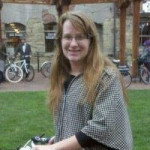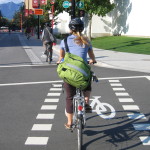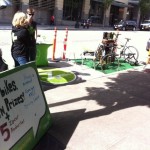Writing a dissertation can be a lonely process. You’re the only person who knows all the material swirling in your brain and in your notebooks. I talk to some people about certain aspects of my project and read books about others while I try to figure out the right combination of story and theory that my adviser enigmatically described as “show, don’t tell.” Blogging about my research helps me feel somewhat connected to the living world of bike advocacy, but even that can feel like scrawling on the wall of a dark cave. It was a welcome surprise, then, when after two years of writing about ethnography, bikes, cities, and social justice, I received an invitation to join an “equity advisory council” organized by the League of American Bicyclists. I would attend the League’s annual National Bike Summit, and I was also invited to present about building a grassroots bike movement at the National Women’s Bicycling Forum. Adonia, ¡ya no estás en Kansas!
So at the end of February I packed my computer, a pile of unread academic journals, and some sensible blouses and boarded a train for the three night ride to Washington, D.C. (A perk of being ABD: I have the free time to do things like take the train across the country.) First there would be a meeting of the new Equity Advisory Council on March 3, followed by the second National Women’s Bicycling Forum on March 4, and the National Bike Summit on March 5-6. I was glad I’d have an opportunity to transition into this national bike advocacy conversation over a few days of increasing activity.
When I sat down at the table and met the other Council members engaged with bicycling and equity, I was eager to shift gears from thinking at length in experimental terms to speaking briefly in concrete ones. The Council came about through the efforts of two League staff members, Hamzat Sani, an Equity and Outreach Fellow, and Carolyn Sczepanski, the Director of Communications and the person responsible for Women Bike, and because of a growing recognition among the League’s leadership that the organization should reflect the United States’ diversity. Alison Hill Graves, a member of the League’s Board of Directors and a guiding force behind the turn toward community-based bicycle programs, participated as a Board liaison as we discussed what the Council could accomplish. I learned about programs and businesses using bicycling as a community empowerment tool in Milwaukee, Chicago, Atlanta, Minneapolis, the Bay Area, New York, Miami, and Long Beach. It was just the beginning of what promises to be a much longer conversation that engages with a lot more people.
The next morning at the National Women’s Bicycling Forum, I learned about women bike builders (you can see the schedule for the day with info about all speakers here). That panel took place in a large ballroom, and I felt like an outsider until I saw some familiar faces in the crowd. Reassured, I headed to a conference room to present about “human infrastructure,” the concept I’m simultaneously writing about in my dissertation and trying to build through my advocacy work. The other presenters on the “Community-Based Bike Advocacy: Building the Movement from the Ground Up” panel were Jenna Burton, who started the Black community ride Red, Bike & Green in Oakland in 2007, and Megan Odette, the organizer of Kidical Mass DC, the local chapter of the family group ride founded in Eugene, OR in 2008. Our panel moderator was Veronica Davis, who is the powerhouse behind Black Women Bike DC. It was empowering to go from writing at home about the need to expand the idea of who rides bicycles to a conference room where articulate women were speaking about the work they are doing to expand the idea of who rides bicycles. After the panel, I got to speak with people from New Orleans, Omaha, and Newport, RI. They all mentioned problems they’d faced with cross-cultural or cross-organizational coordination around bike projects, and that gave me a renewed sense that there’s room in the movement for ideas like human infrastructure that are grounded in theory but work in practice.
Then, during lunch, we listened to Illinois Representative Tammy Duckworth, a veteran who lost both legs in Iraq, tell her story of learning to ride a recumbent handcycle during her recovery. She’s now a member of two cycling clubs. Judging by the standing ovation she received, I don’t think I was the only one impressed. Representative Duckworth’s speech highlighted two important considerations for advocates: including those with disabilities and connecting with bicyclists in the military.
I was curious to hear the afternoon’s keynote speaker, New York City Transportation Commissioner Janette Sadik-Kahn. The way she responded to an audience member’s concerns about gentrification when I saw her speak in L.A. in 2010 figured heavily in an academic article I wrote last year. Sadik-Kahn did bring up the issue of opposition to bike lanes in Brooklyn, and she explained it as a case of media hype. I can’t speak to the NYC situation, but in the cases of opposition to bike lanes I’ve observed, there have been deeper stories that connect with legacies of prejudice, unequal distribution of public resources, and even segregation. Sadik-Khan’s record as a woman who has changed the game for public space in New York, and beyond because of that city’s influence. I did feel lonely in the ballroom with these thoughts, though, while I watched others cheer enthusiastically about new street designs.
And that was the end of the National Women’s Bicycling Forum, followed immediately by the beginning of the National Bike Summit. The same ballroom filled with a new crowd that organized itself according to state affiliation. I was about to learn what happens when state advocacy leaders go to Washington.



